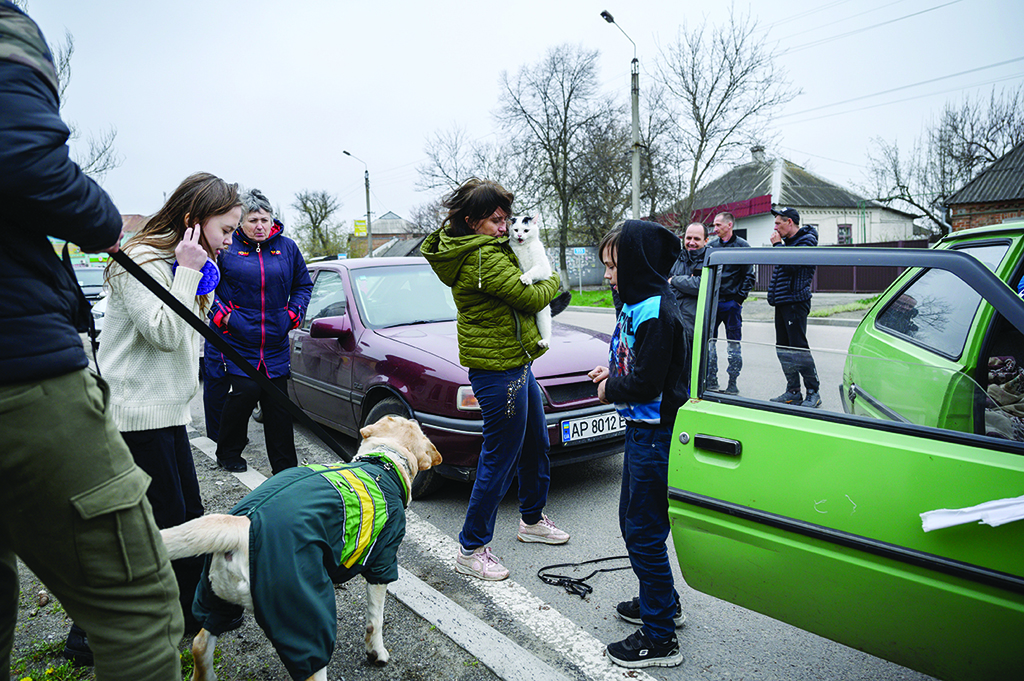MALA TOKMACHKA, Ukraine: Tanya Los was washing the dishes at home in her southern Ukrainian village Mala Tokmachka on Sunday, her daughter Anastasia by her side, when a Russian rocket crashed into her kitchen. By what she called a "miracle", both women survived unscathed. But the Los household was not the only civilian infrastructure hit by Russian forces in Mala Tokmachka in recent weeks, as Moscow intensifies attacks on Ukraine's south and east. Rockets have been raining down on the village, which lies around 60 kilometres (40 miles) southeast of regional hub Zaporizhzhia.
One of the village schools was hit, as was the building housing its teachers. A rocket blasted a hole in the facade of the local cultural centre. A village resident who now leads the local territorial defence group, Yuriy, told AFP that several houses were hit by Russian air strikes on Sunday.
One of the houses only has its walls left standing, and seems to have been taken over by cats. Half a dozen tomcats reigned in the yard of the abandoned home. The Los home was far luckier. A corner of the kitchen, which is isolated from the main body of the house, was pierced by a rocket. A plastic screen now covers two sections of the wall in the room and the floor has been damaged.
Constant shelling
"If it wasn't for the fridge, my daughter would have been killed," Tanya Los said. The 59-year-old mother said the pair were "protected" by an Orthodox icon in the room, where a religious calendar still hangs. Anastasia, 24, was too shaken to speak to AFP.
The remnants of the rocket still lay in the family's kitchen, and it is hard to comprehend how the women survived the strike. The almost two-meter silver rocket had broken in two as its tail fins came off during the strike. It should not have left the mother and daughter any chance of surviving. "It's a miracle," Tanya said. Based on the serial number on the wreckage and using the Norwegian Defence Research Establishment's online archive, AFP found that the rocket was likely fired from a Soviet-designed BM-27 Uragan missile launcher.
The weapon that hit the Los household would have dispersed submunitions in flight before crashing into the small brick house. "Now every time we hear the sound of bombardment, we run to the basement," Tanya said. "The problem is that in the last two days it never stops. Day and night." During the hour and a half that AFP was in Mala Tokmachka, the roar of heavy weapons was constant. It often came from nearby as the Ukrainian army launched outgoing fire. Russian forces responded from a distance.
AFP found the same in the town of Orikhiv, a dozen kilometres away. "In the last two or three days, the shelling has been more intense," said Dmytro Malyovanysk, a fire brigade deputy chief, whose men intervened Tuesday after a supermarket and doctor's office where damaged by Russian rockets.
Suitcases ready
"A week ago, we could hear some sounds of war, but they came from afar," said Ira Pelechko, the owner of a shop plunged into near darkness most of the day due to power cuts. "Now, when it comes from the Russian side, the houses shake and it is much more frequent," one of her clients, Vitaly Dovbnia, said.
He said he keeps a packed suitcase in his car, ready to flee at any moment. Ukrainian President Volodymyr Zelensky on Monday evening announced that Russia had renewed its offensive in the east of the country. But on the southern front the increase in attacks appears to have started earlier. Artur Kharlamov fled Russian-occupied Melitopol north to Orikhiv on Tuesday. He claimed to have seen Russian troops digging trenches in three different places during his journey.
Fresh Ukrainian trenches are also visible on the Ukrainian side. Tanya and Anastasia Los remained stuck in the grey zone between the two camps. They were almost alone in their village, with Mala Tokmachka emptying and a little more destroyed with every day. Tanya Los said two cows they own are their only wealth. One of them is going to calve soon. "I can't leave her," she sighed softly, as heavy weapons roared nearby. - AFP











